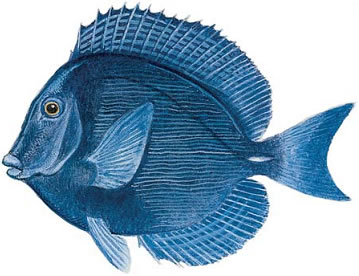A member of the surgeonfish family that has distinctive coloration and is occasionally encountered by anglers, the blue tang is sometimes used as an aquarium fish and is also marketed fresh.
Identification
The oval, deep-bodied, and compressed blue tang is more circular than are other surgeonfish. Its coloring is almost entirely blue, ranging from powdery to deep purple, and it has many dark or light blue horizontal stripes running down the sides and blending into the background.The dorsal and the anal fins have a bright blue border, and there is a white or yellow spine on the base of the tail. Juvenile blue tang are colored bright yellow, whereas intermediate fish have blue heads and bodies and yellow tails.
 |  |
The yellow of the tail is the last to change to blue, and some fish are found with yellow tails. The change from juvenile to intermediate to adult coloration does not depend on size; some blue adults are smaller than yellow juveniles.
